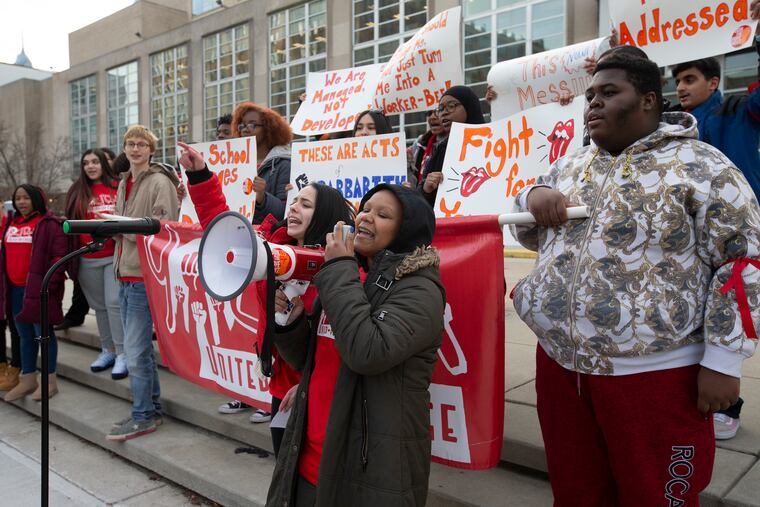Advocates rally to get Philadelphia School District to publicize mental health resources for students
Mental health advocates rallied outside a meeting of the Philadelphia School Board Thursday, protesting what they see as a broken promise to help students find mental health resources.

Mental health advocates rallied outside a meeting of the Philadelphia Board of Education on Thursday, protesting what they see as a broken promise to help students find mental health resources.
The nonprofit organizations involved — Youth United for Change and the National Women’s Law Center — expressed frustration with the lack of action from the School District, which they said verbally committed to a multiplatform rollout of a list of existing mental health resources for students on the first day of school during a meeting in June. The conversation followed months of meetings with district officials, school board members, and city councilmembers.
The demand for more action came after the National Women’s Law Center published a report in April about the mental health of Latina students in Philadelphia, titled “We Are Not Invisible,” in which they found that one in seven Latina girls in Philly has attempted suicide. The report recommended establishing peer support circles and creating mental health screenings.
At the rally, students in red T-shirts emblazoned with “United for Change" led a chant as they displayed the posters that they had prepared for the demonstration.
“What do we want? Transparency! When do we want it? Now!”
“We were very clear we wanted there to be physical materials, like posters or pamphlets,” said Nick Ospa, the citywide organizer for Youth United for Change, a student-led organization fighting for educational rights for low-income youth of color.
The printed materials were one part of a more extensive mental health recommendation summary from the students, which includes measures like a quarterly survey that students use to report stressors.
Ospa said that he reached out to the School District multiple times over the summer to check on the status of the rollout of materials on mental health resources but didn’t get a response.
In August, representatives from the National Women’s Law Center met with School District officials and Councilmember Maria Quiñones-Sánchez, who is the new chair of the education committee, to discuss the report.
“We raised some things that were pretty easy to implement before the school year began, like disseminating materials to make sure students knew where to find resources,” said Adaku Onyeka-Crawford, the director of educational equity and senior counsel at the National Women’s Law Center.
Angela Calderón, who coauthored the report as a senior at El Centro de Estudiantes last year, said that it was “really discouraging” that more progress wasn’t made with Sánchez.
The materials were not available to students on the first day of school, so Youth United for Change students testified at the school board meeting in September on the lack of progress.
Then in November, School District officials told both organizations through email that they would refrain from making commitments to students until they had consulted Sánchez on requests pertaining to mental health.
Sánchez disputed this.
“I have a real interest in this issue, absolutely, but all discussions are very much public, very much transparent,” she said.
On Jan. 23, School District officials sent an email to all high school students identifying mental health resources in different areas of the city, but Ospa said that feedback to the materials that were recommended by Youth United for Change students, such as including names of mental health staff and Title IX coordinators at each school, was not included.
“We were kind of confused because it was earlier in the year when [the School District] asked for our feedback on certain things,” said Aniya Timberlake, a senior at Bodine High School working with Youth United for Change. “And then [they] basically didn’t take our feedback.”
At Thursday’s school board meeting, Rebecca Baret, a freshman at Central High School, testified about how “shocked and disappointed” she was when she saw the email.
“Although it had some resources, it was very confusing to read and overall unclear on how to access some of the alternatives they were providing,” said Baret. “How do you expect teens to get help if you don’t give them the tools they need?”
Karyn Lynch, the School District’s chief of student support services, said the district’s position was that Sánchez made it clear that she had a model on making changes to mental health in schools during the meeting in August.
Sánchez said in a statement Thursday that she strongly encouraged the School District to meet with stakeholders to work through concerns. She also said that she believed the district was moving in the right direction.
But Ospa disagrees. “There’s been no accountability to these students who have been very diligent, thinking very hard about the issue of mental health in schools,” he said. “We’re not just random students who are off the cuff, spitballing here. We actually represent the voices of students across the district."